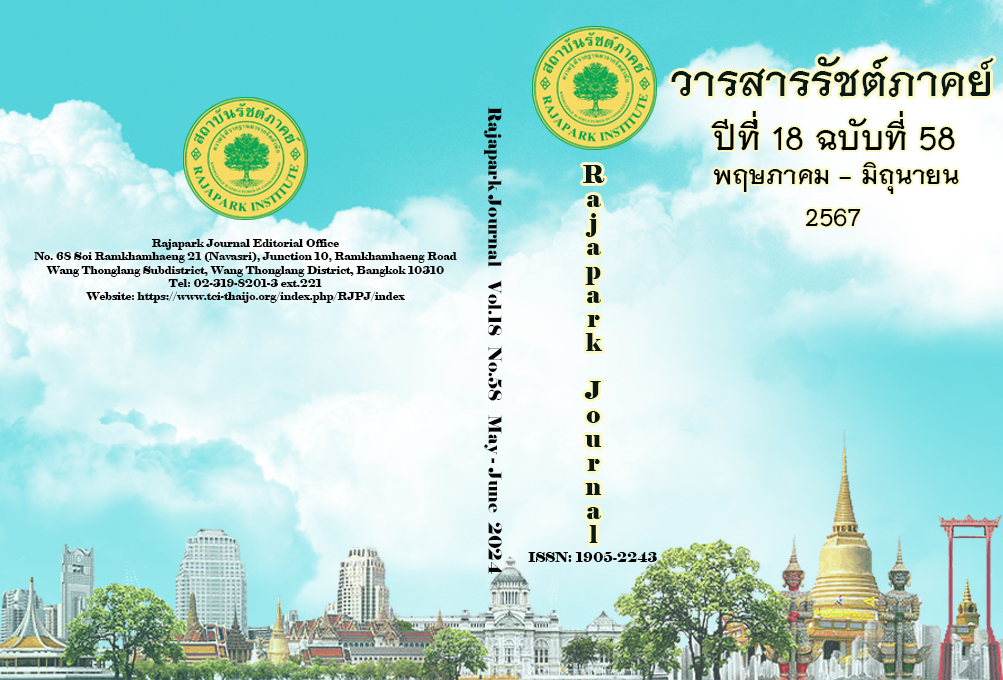Emerging Trends in Global Education a Qualitative Analysis of Thailand's Ascendance as a Preferred Destination for Management Studies
Main Article Content
Abstract
This research aims to uncover the motivations of Chinese students opting for management studies in Thailand and to proffer strategic insights for augmenting the internationalization of higher education management in Thailand and elevating the caliber of study abroad services provided to international students. The research employed a questionnaire survey method targeting Chinese students studying management in Thailand, including 27 doctoral students, 70 undergraduates, and 32 master students, collecting over 122 valid responses. The study analyzed these responses using thematic analysis and grounded theory to identify relevant themes and keywords, construct a coding system, and develop a theoretical model of Chinese students' choice of Thailand as a destination for management studies. Additionally, the study built a knowledge map to elucidate this motivation. The findings were found as follows: 1. geographical and economic considerations, educational system advantages, cultural and social engagement, personal and professional development, misinformation, and exploration and curiosity--these factors contribute to Chinese students' decisions to study management in Thailand; 2. factors among practical considerations, the pursuit of personal, and professional enrichment, indicate a complex interaction.
Article Details

This work is licensed under a Creative Commons Attribution-NonCommercial-NoDerivatives 4.0 International License.
Views and opinions appearing in the Journal it is the responsibility of the author of the article, and does not constitute the view and responsibility of the editorial team.
References
Arnold, K., & Zhu, H. (2011). Student Services in China. International Higher Education, (65). https://doi.org/10.6017/ihe.2011.65.8574
Behboodi, A., & Piantanida, P. (2012). Selective coding strategy for unicast composite networks. 2012 IEEE International Symposium on Information Theory Proceedings, 1321-1325. https://doi.org/10.1109/ISIT.2012.6283072
Boonsuk, Y., & Ambele, E. A. (2021). Existing EFL pedagogies in Thai higher education: Views from Thai university lecturers. Arab World English Journal (AWEJ), 12. https://doi.org/10.2139/ssrn.3892851
Boonsuk, Y., & Fang, F. (2022). Perennial language learners or competent language users: An investigation of international students’ attitudes towards their own and native English accents. RELC Journal, 53(1), 40-55. https://doi.org/10.1177/003368822092671
Buasuwan, P. (2018). Rethinking Thai higher education for Thailand 4.0. Asian Education and Development Studies, 7(2), 157-173. https://doi.org/10.1108/AEDS-07-2017-0072
Cao, Z., Anderson, V., Xu, F., & Caldwell, C. (2018). Understanding Chinese students’ values–insights for tomorrow’s managers. International Journal of Public Leadership, 14(2), 119-136. https://doi.org/10.1108/IJPL-10-2016-0036
Chalapati, N., & Chalapati, S. (2020). Building a skilled workforce: Public discourses on vocational education in Thailand. International journal for research in vocational education and training, 7(1), 67-90.
Chiang, M., & Chen, P. (2022). Education for sustainable development in the business programme to develop international Chinese college students’ sustainability in Thailand. Journal of Cleaner Production, 374, 134045. https://doi.org/10.1016/j.jclepro.2022.134045
Cranston, S., & Esson, J. (2024). Producing international students: Migration management and the making of population categories. The Geographical Journal. https://doi.org/10.1111/geoj.12582
Crocco, O. S., & Pitiyanuwat, S. (2022). Higher education in Thailand. In International Handbook on Education in South East Asia (pp. 1-24). Springer.
Glaser, B. G., & Hon. (2016). Open Coding Descriptions. Grounded Theory Review: An International Journal, 15.
Glass, C. R., & Cruz, N. I. (2022). Moving towards multipolarity: shifts in the core-periphery structure of international student mobility and world rankings (2000–2019). Higher Education, 85, 415-435. https://doi.org/10.1007/s10734-022-00841-9
Hines, A., & Dockiao, L. (2021). Key issues influencing the future internationalization of higher education: the case of Thailand. On the Horizon, 29(3), 77-100. https://doi.org/10.1108/OTH-03-2021-0044
Hou, A. Y. C., Zhang, J., Justiniano, D., Lu, G., & Jun, G. (2020). Internal and External Quality Assurance of Higher Education in the Asia-Pacific Region. In Global Trends in Higher Education Quality Assurance (pp. 168-224). Brill. https://doi.org/10.1163/9789004440326_008
Luo, Y., Latukha, M., & Panibratov, A. (2023). International Student Mobility: A Systematic Review and Research Agenda. International Journal of Consumer Studies. https://doi.org/10.1111/ijcs.12911
Mangmeechai, A., & Jirapornvaree, I. (2019). Factors Influencing ASEAN and International Students of Higher Education Programs in Thailand. Asian Social Science, 15(9), 67-81. https://doi.org/10.5539/ass.v15n9p67
Pongsin, V., Lawthong, N., Fry, G. W., Ransom, L., Kim, S., & Thi My, N. N. (2023). Thailand as a new international higher education hub: Major challenges and opportunities, a policy analysis. Research in Comparative and International Education, 18(2), 249-276. https://doi.org/10.1177/17454999231163401
Ren, R., & Qi, Y. (2024). Conflicting geographical imaginaries in globalised labour markets: The local valorisation of international education among employers and returned international students. Transactions of the Institute of British Geographers, e12681. https://doi.org/10.1111/tran.12681
Snodin, N., Young, T., Thongnuan, T., Bumrungsalee, I., & Nattheeraphong, A. (2021). The migration of international academics to Thailand and their experiences of Thai higher education. Sojourn: Journal of Social Issues in Southeast Asia, 36(2), 225-257.
Sujarittanonta, L., Nithisathian, K., & Walsh, J. C. (2016). Collaborative Provision of Graduate Education in CLMV: Case of Thailand’ s Private Universities. Journal of Education and Vocational Research, 7(2), 49-57. https://doi.org/10.22610/jevr.v7i2.1340
Thomas, D. (2020). Factors that contribute to homesickness among students in Thailand. Kasetsart Journal of Social Sciences, 41(1), 136-141.
Vaismoradi, M., Jones, J., Turunen, H., & Snelgrove, S. (2016). Theme development in qualitative content analysis and thematic analysis. https://doi.org/10.5430/jnep.v6n5p100
Vollstedt, M., & Rezat, S. (2019). An Introduction to Grounded Theory with a Special Focus on Axial Coding and the Coding Paradigm. ICME-13 Monographs. https://doi.org/10.1007/978-3-030-15636-7_4
Waters, T., & Day, M. J. (2022). Thai menschenbild: A study of Chinese, Thai, and international students in a private Thai university as measured by the national survey of student engagement (NSSE). Humanities and Social Sciences Communications, 9(1), 1-12. https://doi.org/10.1057/s41599-022-01101-y
Wen, W., & Hu, D. (2019). The emergence of a regional education hub: Rationales of international students’ choice of China as the study destination. Journal of Studies in International Education, 23(3), 303-325. https://doi.org/10.1177/1028315318797154
Yang, Z., & de Wit, H. (2019). International students in China: Facts, paths, and challenges. International higher education (97), 18-20. https://doi.org/10.6017/ihe.2019.97.10945
Yong, L., & Xudong, D. (2015). Study on the Management Strategy of Chinese overseas students Based on the cooperation of WUST and WU. In 2015 International Conference on Social Science and Technology Education. Atlantis Press.


